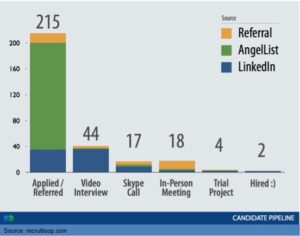Building your initial core team is one of the most crucial initial steps for a startup. Products change, ideas change, markets (and customers change), but your team is constant. So allocate a lot of your time to hire the best possible team.
Reality of startup hiring
1. Do hire T-shaped people instead of specialists
T-Shaped = broad in many areas and deep in one. For instance we found that while expertise in back end java is great, it really helps to also have at least a familiarity with front end coding because lets face it – everyone should do whatever it takes to get stuff done at an early stage.
2. Do hire for passion
Passion > skill or knowledge at all times (within certain bounds of course). A couple of people I interviewed, though highly competent did not feel equally passionate about the idea. Why is this bad? They can easily jump ship and may not be as committed to the company as others.
3. Do hire thru referrals
No brainer actually. When looking to hire a front end engineer, I was speaking with many candidates (see graph above) who just did not cut it. My back end engineer thankfully came to know someone who just entered the market and this ended up being a great hire.
4. Do give competitive levels of equity
The difference in % of equity will not matter if your company goes down. You would rather lose a small portion of your equity but gain a solid team that works with you. Thankfully I was given good suggestions from my mentors before I started hiring and it was great advice. Use sources like Wealthfront for competitive equity levels and make sure you hit at least that to attract good talent. Without a good team your founder level equity is worth nothing.
5. Do not run interviews like skillset trivia
“Write a function that can detect a cycle in a linked list.” – actual interview question! Unless very directly correlated to the job, questions like this do nothing except showcase the interviewer’s trivia knowledge. I got the help of a good friend for initial tech interviews beforehand and avoided this trap. Interviewing for actual work thru mini case studies is much more productive.
6. Do not outsource your initial tech work
Caveat: some exceptional cases this does make sense – when you just want a bare minimum proof of concept to get funding. But in most other cases, the amount of effort it takes to manage outsourced tech providers is underrated. They oversell the quality of work (and under deliver). You may end up with an under delivered tech product and also not know much about the inner workings of what is delivered to you. Better to have your own core tech team if you can pull it off.
7. Do not be swayed by senior level ideators
Nothing against senior exec career backgrounds. But if they cannot do the actual work to get stuff done (Doers), then they are not a good fit at an early stage. I met a few execs from retail and payment backgrounds with pie in the sky ideas. When probed with more details on “What should we do to get our first client and the next 3 clients?” their ideas were clearly out of touch with ground realities. Test for this before being impressed by fancy resumes.
8. Do not hire anyone who only focuses on her/his upside
Scenario: Me interviewing a candidate
- Me: Now that you see how the product works, it will be great to gather your inputs on where else we can innovate as we work together.
- Candidate: Sure. But can we talk about my title first? Will I get a VP level title? If not, is there scope for me to move up to a VP level over time?
- Me: We are very early stage. None of us have any titles. We are more focused on what we can do as a company to get from point A to point B. Titles come in the future.
- Candidate: I think I would want a title when I join.
- Me (Thinking): and we are done!
Titles do matter (as do compensation and equity) at later stages of a company. But at a very early stage titles do not matter much. What matters more is how we make the company grow (so we can grow with the company). The problem with title driven (or personal benefits driven) people is that their need for personal upside is much greater than passion for the company, to the point that when we hit tough times (which we all will), they tend to jump ship instead of working to turn things around.
9. Do not expect only A players for your team
Myth – “A players only hire A players”.
Reality – A players form a small percentage of hiring pool and many are absorbed by tech giants.
Expecting only A players is bad planning by founders given the competitive hiring market. A better plan is to hone your management skills such that you can show progress with B or even C players in the team.


